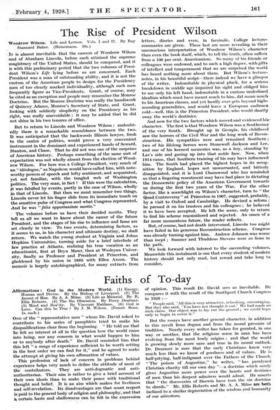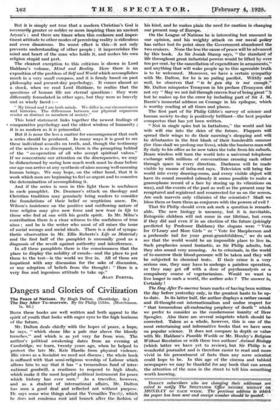Faiths of To-day
.Affirmations : God in the Modern World. (1) Energy, Human and Divine. By the Bishop of Liverpool. (2) The Ascent of Man. By A. A. Milne. (3) Life as Material. By R, Ellis Roberts. (4) The Sin Obsession. By Percy Dearmer. (6) Mind and Realty. By Viscount Haldane. (6) God is Love. Can this be True ? By J. M. Wilson. (Ernest Benn.
ls. each.) ' ls. each.) '
ONE of the " representative men " whom Dr. David asked to contribute to his series of pamphlets tried to make his disqualifications clear from the beginning. " He told me that he felt no interest at all in the question how the world came
into being, nor any concern in what would happen to him or to anybody after death." Dr. David reminded him that this left " a range of experience sufficient to be worth setting in the best order we can find for it," and he agreed to make the attempt at giving his own affirmation of values.
This profession of lack of concern in • problems behind
experience helps very -much to define the attitude of most of the contributors. They are anti-dogmatic and anti-
authoritarian. Their aim is rather to give a brief account of
their own ideals than to make their peace with traditional thought and belief. It is an aim which 'makes for liveliness
and self-revelation. Its disadvantages are that scant respect is paid to the general body of religion and philosophy, and that a certain haste and shallowness can be felt in the expression of opinion. This result Dr. David sees as inevitable. He compares it with the result of the Southport Church Congress in 1926 :—
" People said, 'All this is very attractive, refreshing, encouraging. But they also said, 'You have not thought it out.' We had made no such claim. Our object was to lay out the ground ; we could hope only to begin to cover it."
But the essays have another general character, in addition to this revolt from dogma and from the moral presstire of tradition. Nearly every writer has taken for granted, in one way or another, that the religious sense in man has been eiolving from the most lowly origins ; and that the world is growing slowly more sane and true in its moral outlook. Dr. Dearmer is sure that the early Chriatians kneir very much less than we know of goodness and of values. He is half-pitying, half-indignant over the Fathers of the Church. " The poison of Augustine," he writes, " hail paralyzed
Christian charity till our own day "—a doctrine which surely gives Augustine more power over the hearts and destinies of men than his deepest admirers would admit. He asserts that " the discoveries of Darwin have torn the sin doetrine to shredi." Mr. Ellis Roberts and Mr. A. A. Milne are both
inclined to a similar depreciation of the wisdom and humanity of our adeestors.
But it is simply not true that a modern Christian's God is necessarily greater or nobler or more inspiring than an ancient Aryan's ; and there are times when this cocksure and imper- tinent attitude to other modes of perceiving reality is ridiculous and even disastrous. Its worst effect is this—it not only prevents understanding of other people ; it impoverishes the mind and heart of the man who holds it, and makes his own religion stupid and pert.
The clearest exception to this criticism is shown in Lord Haldane's volume, Mind and Reality. Here there is an exposition of the problem of Self and World which accomplishes much in a very small compass, and it is firmly based on past philosophy and present-day psychology. It comes almost as a shock, when we read Lord Haldane, to realize that the questions of human life are eternal questions : they were differently formulated in other ages, but they were as bravely and as wisely faced :—
" My friend and I are both minds. We differ in our circumstances and histories. The differences between our physical organisms render us distinct as members of society."
This brief statement links together the newest findings of
• comparative psychology and the oldest wisdom of humanity ; it is as modem as it is primordial.
But it is none the less a matter for encouragement that such a- series should be produced. In many ways it is good to see these individual assaults on truth, and, though the testimony of the writers is so discrepant, there is the prompting behind of the " co-operation of all who accept spiritual values." If we concentrate our attention on the discrepancies, we may be disheartened by seeing how much work must be done before our age can arrive at any synthesis of aims among well-meaning human beings. We may hope, on the other hand, that it is work which men are beginning-to feel as-urgent and to conceive the determination of accomplishing it.
And if the series is seen in this light there is usefulness in each- pamphlet. Dr. Dearmer's attack on theology and Christian tradition may genuinely bring readers to consider the foundations of their belief or scepticism anew. Dr. Wilson's insistence on the positive and outflowing nature of true religion may give new force and new trust in life to those who feel at one with his gentle spirit. In Mr. Milne's contribution there is a clear witness to:the usefulness of true aims ; and he is the writer who most of all raises the issue of social wrongs and social ideals. There is a deal of sympa- thetic observation in Mr. Ellis Roberts's Life as Material; and the first half of the - pamphlet is unusually good as a diagnosis of the revolt against authority and interference.
In all these pamphlets there is the consciousness that the place to display the nobility of creeds—and the place to put them to the test—is the world we live in. All of them are impatient with any discussion for the sake of discussion, or any adoption of beliefs from the thought " Here is a very fine and ingenious attitude to take up."
ALAN PORTER.







































 Previous page
Previous page